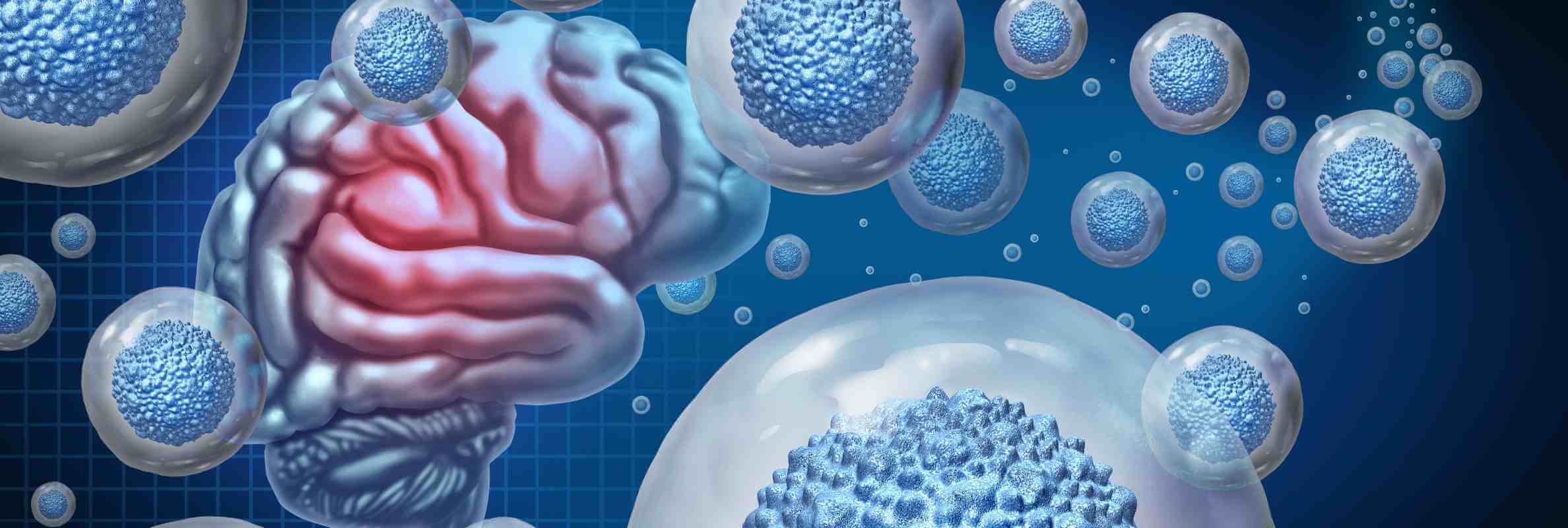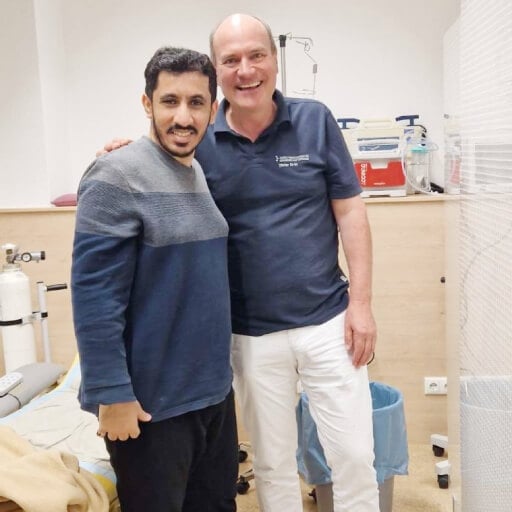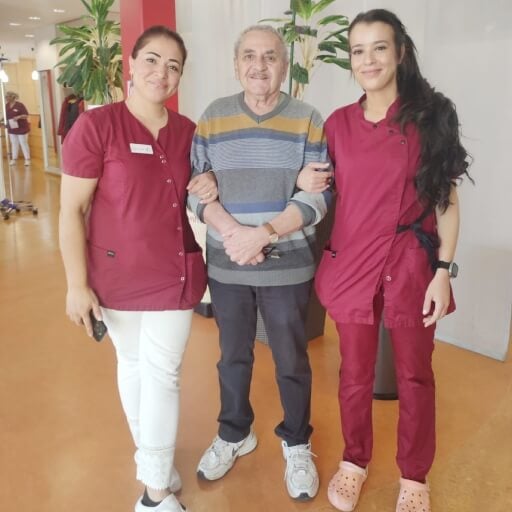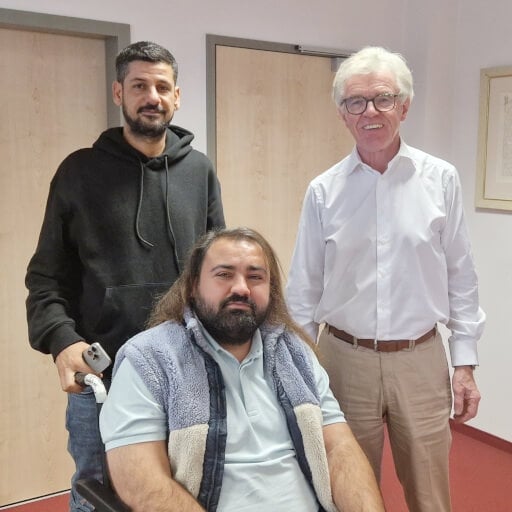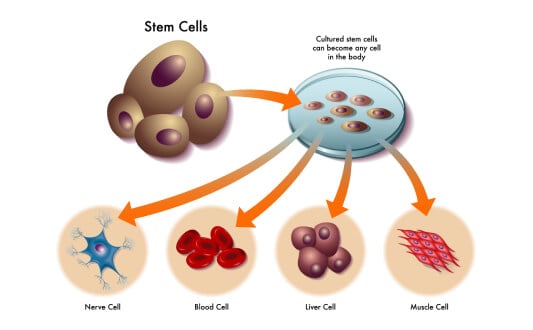Деменция поражает 47 миллионов человек во всем мире, и ожидается, что к 2050 году их число достигнет 131 миллиона [1]. Традиционные терапевтические подходы позволяют лишь контролировать симптомы заболевания, тогда как новый метод лечения деменции с применением стволовых клеток дает пациентам новую надежду, воздействуя на первопричины повреждения головного мозга. Эти уникальные клетки способны подавлять воспалительные процессы в головном мозге, очищать его от отложений токсичных белковых и даже способствовать восстановлению утраченных нейронных связей. Клинические испытания демонстрируют многообещающие результаты: у пациентов улучшается память и когнитивные функции [2]. Для семей, столкнувшихся с таким непростым диагнозом, терапия стволовыми клетками представляет собой перспективный метод лечения, который может не только замедлить прогрессирование заболевания, но и способствовать активному восстановлению функций головного мозга.
Деменция: особенности заболевания и его влияние на головной мозг
Деменция – это общий термин для обозначения группы прогрессирующих заболеваний, повреждающих клетки головного мозга в отдельных его участках, что впоследствии влияет на способности человека к запоминанию, мышлению и речи. К числу наиболее распространенных типов деменции относятся болезнь Альцгеймера, поражающая 5,8 миллиона американцев [2], сосудистая деменция, деменция с тельцами Леви и лобно-височная деменция [3].
При болезни Альцгеймера амилоидные бляшки накапливаются вне нейронов, а нейрофибриллярные клубки формируются внутри клеток – особенно в гиппокампе и височных долях головного мозга. Это состояние сопровождается атрофией и глиозом этих критически важных для памяти участков головного мозга уже на ранних стадиях заболевания. Причиной развития сосудистой деменции является снижение кровоснабжения головного мозга, обычно вследствии инсульта или транзиторной ишемической атаки, которые приводят к необратимому повреждению клеток. При деменции с тельцами Леви в головном мозге формируются аномальные отложения белка α-синуклеина, в результате чего нарушаются двигательные функции и контроль регуляции моторики, при этом во многих случаях память страдает в меньшей степени, чем при других типах деменции.
Патологические изменения запускают каскадные нарушения во всей нервной системе. Массовая потеря нейронов и синапсов является основным признаком деменции и наиболее тесно коррелирует с ухудшением когнитивных функций. Хроническое нейровоспаление развивается вследствие активации микроглии, провоцирующей выработку вредных цитокинов, таких как фактор некроза опухоли-α и интерлейкин-1β. Все эти изменения затрагивают множество когнитивных процессов:
- Формирование и воспроизведение памяти, особенно в отношении недавних событий и новой информации
- Речевые навыки – от трудностей с подбором слов до полного нарушения коммуникации
- Исполнительные функции, влияющие на планирование, принятие решений и решение проблем
- Визуальное распознавание и пространственное восприятие, определяющие способность ориентироваться в пространстве и узнавать знакомые объекты
- Регуляцию поведения, нарушения которой приводят к изменениям личности и неадекватным социальным реакциям
Современные виды фармакотерапии в основном направлены на купирование симптомов. Достижения в области разработки методов лечения, способных предотвратить гибель нейронов, по-прежнему остаются ограниченными. Современные лекарственные препараты лишь замедляют прогрессирование заболевания, но они не способны устранить первопричину развития нейродегенеративных процессов или обратить вспять уже присутствующие у пациента повреждения головного мозга. В решении этих проблем как раз может помочь терапия стволовыми клетками.
Потенциал терапии стволовыми клетками в лечении деменции
Для семей, столкнувшихся с деменцией, терапия стволовыми клетками представляет собой принципиально новый подход к лечению, который целенаправленно воздействует на биологические процессы, вызывающие повреждение головного мозга. В отличие от традиционных терапевтических методик, направленных на устранение симптомов, стволовые клетки обладают регенеративными свойствами, благодаря которым они потенциально способны одновременно воздействовать сразу на несколько механизмов дегенерации нейронов.
Стволовые клетки – это недифференцированные клетки, которые ещё не трансформировались в специализированные клетки конкретного органа. Они присутствуют в костном мозге, жировой ткани и крови. По данным исследований, МСК (мезенхимальные стволовые клетки) способствуют нейрогенезу и ангиогенезу, а также предотвращают потерю нейронов за счет антиапоптотического эффекта, обусловленного высвобождением факторов роста, нейротрофинов и цитокинов [4].
Терапевтический эффект при лечении деменции стволовыми клетками обеспечивается за счет таких механизмов [5]:
- Удаление вредных бляшек бета-амилоида путем стимуляции деградирующих ферментов, например, неприлизина и инсулин-деградирующего фермента
- Иммуномодулирующее действие за счет активации микроглии с целью очистки головного мозга от отложений
- Снижение интенсивности нейровоспаления путем снижения уровня воспалительных маркеров, например, IL-10 и TNF-α
- Предотвращение запрограммированной гибели клеток посредством выработки жизненно важных факторов роста, включая VEGF, BDNF и NGF
- Миграция к поврежденным участкам головного мозга, где стволовые клетки способны дифференцироваться в нейроноподобные клетки и экспрессировать важные ферменты
Регенеративные свойства стволовых клеток служат основанием для рассмотрения их в качестве потенциальной альтернативы в лечении деменции. Более того, в перспективе метод даже может применяться для профилактики этого заболевания. Чтобы помочь семьям, столкнувшимся с диагнозом «деменция», оценить перспективы проведения лечения стволовыми клетками в клинических условиях, мы побеседовали с доктором Зибенхюнером – ведущим экспертом Германии в этом медицинском направлении. Специалист занимается проведением терапии стволовыми клетками с 2005 и ежегодно принимает на лечение 100-300 пациентов. В своем эксклюзивном интервью он делится ценной информацией об особенностях применения терапии стволовыми клетками в клинической практике и рассказывает о преимуществах этого метода.
Интервью с ведущим экспертом по стволовым клеткам доктором Зибенхюнером
Как врачи используют стволовые клетки для борьбы с деменцией
Если отойти от научных исследований и оценить результаты применения терапии стволовыми клетками в клинической практике, становится очевидно, что для семей, столкнувшихся с деменцией, она стала реальной возможностью взять заболевание под контроль. В современных медицинских центрах строго соблюдаются тщательно разработанные протоколы проведения терапии стволовыми клетками, что гарантирует предоставление пациенту эффективного и безопасного лечения.
Этапы лечения: чего ожидать пациентам
В первый день лечения стволовыми клетками пациент проходит комплексное диагностическое обследование, в ходе которого лечащий врач оценивает его состояние и подбирает для него оптимальную терапевтическую методику. В рамках подготовки к терапии врачи могут назначать специальные лекарственные препараты для увеличения количества активных стволовых клеток в организме пациента, что в свою очередь способствует обеспечению наилучшего результата лечения.
На второй день осуществляется забор стволовых клеток одним из двух надежных способов. В первом случае для получения стволовых клеток из костного мозга выполняется пункция гребня подвздошной кости. Альтернативный вариант – забор стволовых клеток из жировой ткани. Доктор Зибенхюнер отмечает, что из жировой ткани можно получить до 500 миллионов стволовых клеток, поскольку она содержит множество различных популяций стволовых клеток.
Затем аутологичные клетки (собственные клетки пациента) подвергаются тщательной обработке в лабораторных условиях, в ходе которой специалисты извлекают стволовые клетки и проверяют их на наличие ВИЧ, цитомегаловируса, вирусов гепатита B и C. На следующем этапе тщательно подсчитывается количество полученных стволовых клеток и оценивается их жизнеспособность – эта мера обеспечивает соответствие суспензии всем требованиям безопасности. Применение запатентованной процедуры обработки стволовых клеток позволяет обеспечить оптимальное качество и стерильность полученного биологического материала.
Как правило, стволовые клетки повторно вводятся в организм пациента уже через два дня после подготовки клеточного материала. Способ введения подбирается в индивидуальном порядке в зависимости от состояния пациента:
- Внутривенная инъекция, обеспечивающая равномерное распределение стволовых клеток по всему телу – при деменции в основном применяется именно этот подход
- Люмбальная пункция, обеспечивающая введение стволовых клеток непосредственно в спинномозговой канал для прицельного воздействия на неврологические пути, пораженные деменцией
Согласно утверждениям доктора Зибенхюнера, при использовании этого нового метода лечения деменции большинство пациентов отмечают улучшение в своем состоянии уже после одного курса терапии. Тем не менее, для достижения оптимальных результатов может потребоваться проведение повторного курса лечения через 3-6 месяцев.
Что должна знать семья пациента о рисках терапии стволовыми клетками
Терапия стволовыми клетками – это абсолютно безопасный метод лечения, так как предполагает использование собственных клеток пациента, что исключает риск отторжения при трансплантации. Противопоказаниями к терапии являются активные инфекции или воспалительные процессы, требующие предварительного лечения. Метод вызывает лишь незначительные побочные эффекты: временное покраснение в месте выполнения инъекции, которое исчезает в течение 1-3 дней, повышенная утомляемость в течение первых двух недель, возможное ухудшение имеющихся симптомов или небольшое повышение температуры сразу после завершения лечения.
Постоянные или долгосрочные побочные эффекты при проведении лечения стволовыми клетками отсутствуют. Таким образом, данный метод профилактики и лечения деменции подходит большинству пациентов при условии отсутствия у них острых инфекционных заболеваний или воспалительных процессов.
Результаты лечения деменции стволовыми клетками
Клинические исследования демонстрируют, что терапия стволовыми клетками обладает очевидными преимуществами по сравнению с традиционными подходами к лечению деменции, поскольку воздействует на ключевые механизмы, лежащие в основе развития заболевания, и служит профилактикой прогрессирования деменции [6].
| Особенность | Традиционное лечение | Терапия стволовыми клетками |
|---|---|---|
| Подход к лечению | Направлено лишь на облегчение симптомов | Прицельно воздействует на механизмы развития нейродегенеративного процесса |
| Механизм действия | Помогает поддерживать функцию нейронов, но не улучшает ее | Способна обеспечить регенерацию поврежденных тканей головного мозга |
| Прогрессирование заболевания | Замедляет прогрессирование нейропатологии на ~6 месяцев | Потенциально способна остановить прогрессирование деменции или даже восстановить нейроны после их разрушения |
| Категории лекарственных препаратов | Ингибиторы ацетилхолинэстеразы, антагонисты NMDA-рецепторов | Собственные клетки пациента, обладающие регенеративными свойствами |
| Побочные эффекты | Нарушения в работе органов пищеварительной системы, головокружения, а также возможно развитие специфических побочных эффектов на фоне взаимодействия препаратов для лечения деменции с другими лекарственными средствами | Минимальный профиль побочных эффектов: повышенная утомляемость (временно), незначительные реакции в месте выполнения инъекции для введения стволовых клеток |
| Продолжительность курса лечения | Ежедневный прием лекарственных препаратов – пожизненно | Как правило, проводится всего 1-2 курса лечения |
| Нейропротекция | Отсутствие эффекта | Снижение уровня маркеров воспаления |
| Нейропластичность | Ограниченный эффект | Способствует формированию новых нейронных связей |
| Качество жизни | Незначительное улучшение качества жизни – лишь на некоторое время | Стволовые клетки способны восстановить утраченные функции |
*Сравнительная таблица составлена на основании доступных клинических данных и результатов актуальных исследований, посвященных изучению методов лечения деменции и применению терапии стволовыми клетками в борьбе с этим заболеванием. Индивидуальные результаты могут варьироваться в зависимости от стадии заболевания и особенностей клинического случая пациента. [7]
Личный опыт семей пациентов с деменцией, решившихся на терапию стволовыми клетками
Маргарет Томпсон с болью в сердце наблюдала, как её престарелый муж Роберт, бывший профессор математики, постепенно угасал из-за болезни Альцгеймера. Заболевание диагностировали на ранней стадии, но лечение традиционными лекарственными препаратами практически не помогало – память ухудшилась до такой степени, что Роберт перестал узнавать даже хорошо знакомые места.
Когда невролог предложил попробовать лечение деменции стволовыми клетками, у Маргарет наконец появился проблеск надежды. После ознакомления с информацией о данном методе лечения в Интернете семья Томпсонов обратилась за помощью в лечебный центр в Германии. «Забор стволовых клеток у Роберта проводили из жировой ткани. Процедура оказалась довольно простой, – вспоминает маргарет. «Не требовалось никакой сложной подготовки».
Суть лечения деменции стволовыми клетками состояла в специальной обработке собственных клеток Роберта и их повторном внутривенном введении в организм. «Около недели после терапии он испытывал легкую усталость, но никаких серьезных побочных эффектов у него не было», – рассказывает Маргарет.
В течение нескольких следующих месяцев после завершения курса лечения постепенно начали проявляться изменения. Сначала у Роберта улучшилась ориентация – он перестал путаться в планировке дома. Затем мы отметили улучшение кратковременной памяти, и он стал активнее участвовать в разговорах.
«Через четыре месяца произошло самое удивительное событие – Роберт помог нашему внуку решить математическую задачу», – с восторгом вспоминает Маргарет. «Впервые за год я снова увидела в нём учителя».
Стволовые клетки не способны обеспечить полное излечение деменции, и семья Томпсонов это понимает, но терапия действительно помогает улучшить состояние пациента с этим заболеванием. Сейчас Маргарет с мужем планируют пройти второй курс лечения. «Роберт снова стал самим собой», – говорит Маргарет. «Теперь у нас есть драгоценное время, которое мы с радостью проводим вместе. А ведь мы думали, что такой возможности у нас больше никогда не будет».
Совет Маргарет другим семьям, столкнувшимся с деменцией, предельно прост: «Ни в коем случае не теряйте надежды! Просто найдите время и ознакомьтесь с информацией о терапии стволовыми клетками. Этот альтернативный вариант лечения деменции помог нам вернуть нашу жизнь. Теперь мы снова можем наслаждаться временем, проведенным вместе».
Терапия стволовыми клеткам: опыт пациентов Booking Health
Влияние терапии стволовыми клетками на течение деменции
Внедрение в клиническую практику терапии стволовыми клетками для лечения деменции ознаменовало начало изменения парадигмы в борьбе с этим заболеванием. Метод помогает не только облегчить симптомы болезни, но также активно воздействует на ключевые механизмы, лежащие в основе ее развития. В отличие от традиционных подходов к лечению, которые, к сожалению, не способны остановить прогрессирование деменции, регенеративная медицина дает семьям реальную надежду. При выборе в пользу лечения деменции стволовыми клетками у пациента есть вполне реальные шансы на улучшение когнитивных функций, а также возможность получить ценное время, которое он сможет провести с близкими.
Этот новый метод лечения помогает восстановить функции головного мозга, которые были нарушены или полностью утрачены из-за деменции. Терапия стволовыми клетками воздействует одновременно на несколько ключевых механизмов болезни: подавляет нейровоспаление, очищает головной мозг от токсичных белковых отложений, предотвращает дальнейшую гибель нейронов и потенциально способствует восстановлению поврежденной ткани мозга. Истории таких пациентов, как Роберт Томпсон, являются наглядным примером того, что при деменции можно добиться существенного улучшения когнитивных функций, включая улучшение памяти, ориентации в пространстве и повседневной активности, в то время как традиционные схемы медикаментозного лечения такого эффекта дать не могут.
Что касается безопасности данного метода лечения, использование собственных стволовых клеток пациента исключает риск отторжения. При этом также практически отсутствуют побочные эффекты – чаще всего наблюдаются лишь кратковременная повышенная утомляемость и незначительные локальные реакции в месте инъекции. Как правило, пациенту с деменцией достаточно всего 1-2 сеансов терапии стволовыми клетками, тогда как традиционный подход предполагает пожизненный прием лекарственных препаратов. Это снижает нагрузку на семью, а больной получает более эффективные результаты. Стоимость терапии деменции стволовыми клетками может отличаться в зависит от выбранного для лечения медицинского учреждения. Как правило, в Германии такое лечение обходится около €22 500.
Самое главное, что терапия стволовыми клетками меняет ожидания пациентов с деменцией и их семей. Раньше единственным вариантом было принятие неизбежного прогрессирования заболевание, но теперь появилась возможность выбрать терапию, которая способна восстановить утраченные функции головного мозга и дать шанс сохранить ценные отношения пациента с близким. Этот переход от контроля симптомов к реальной возможности восстановления при деменции является важным поворотным моментом в определении будущих подходов к лечению болезни.
Поездка на лечение за границу с Booking Health
Поиск оптимального варианта лечения деменции стволовыми клетками – это путь, на котором семьям пациентов предстоит принимать сложные медицинские решения в эмоционально непростой для них период жизни. После изнуряющих попыток побороть эту болезнь с помощью традиционных методов лечения и консультаций с многочисленными специалистами семьи часто охватывает чувство беспомощности, поскольку врачи дают весьма противоречивые рекомендации, и у них нет уверенности в том, что делать дальше.
В подобных ситуациях для достижения наилучших результатов решающим фактором становится выбор правильного медицинского центра и подхода к лечению. Предоставление пациенту специализированного инновационного лечения может кардинально изменить его прогноз, превращая перспективы неизбежного ухудшения состояния больного на реальный шанс добиться значимого восстановления. Однако для этого необходимо выйти за рамки стандартных протоколов и решиться на смелый шаг – лечение в другой стране, где клиники обладают богатым экспертным опытом в области терапии стволовыми клетками.
Чтобы сделать осознанный выбор и получить индивидуальную схему лечения деменции, адаптированную к особенностям клинической ситуации вашего близкого человека, обратитесь за помощью к специалистам компании Booking Health. Обладая 12-летним опытом в области организации лечения за рубежом с применением инновационных терапевтических методик, Booking Health заслуженно гордится экспертными компетенциями в области составления комплексных программ лечения сложных неврологических заболеваний.
Booking Health – авторитетная компания, которая предлагает организацию лечения за границей с составлением персонализированных программ терапии стволовыми клетками, прямым бронированием записи на прием в клинике и полной поддержкой на протяжении всего курса лечения. Мы предлагаем:
- Оценку и анализ медицинских заключений и результатов визуализационных исследований
- Составление индивидуальных программ лечения стволовыми клетками
- Помощь в выборе ведущих клиник, специализирующихся на лечении неврологических заболеваний стволовыми клетками
- Подготовку и направление медицинской документации пациента в выбранную для лечения клинику
- Предварительные консультации со специалистами выбранной для терапии клиники для планирования лечения на этапе подготовки к поездке на лечение в другую страну
- Консультации профильных специалистов во время пребывания в стационаре и проведения лечебных процедур
- Комплексную координацию последующего ухода после возвращения пациента на родину
- Помощь с оформлением документов и решением всех формальностей
- Полную организацию поездки на лечение за рубеж
- Помощь в оформлении визы, бронирование авиабилетов и координацию проживания пациента в другой стране на период лечения
- Услуги персонального координатора и переводчика 24/7
- Прозрачные цены на лечение без скрытых платежей и непредвиденных расходов
Благополучие вашей семьи – одна из главных ценностей в жизни, поэтому при выборе в пользу инновационных методов лечения деменции здоровье вашего близкого человека следует доверять только надежным экспертам с успешным опытом и проверенной репутацией. Booking Health – ваш надежный партнер, предоставляющий доступ к передовым методам лечения стволовыми клетками, которые дают надежду на улучшение когнитивных функций и повышение качества жизни пациента с деменцией. Свяжитесь с нашими медицинскими консультантами, чтобы узнать о возможностях персонализированного лечения у ведущих специалистов по деменции в разных странах мира.
Частые вопросы и ответы на них, которые помогут обрести надежду и избавиться от опасений
Отправить запрос на лечениеПри проведении терапии стволовыми клетками используются недифференцированные клетки, полученные из собственного костного мозга или жировой ткани пациента. В отличие от традиционных методов лечения, которые преимущественно направлены на облегчение симптомов деменции, терапия стволовыми клетками помогает устранить первопричины повреждения головного мозга при этой болезни.
Стволовые клетки помогают подавить опасные воспалительные процессы в головном мозге, очищают его от токсичных белковых отложений, в частности амилоидных бляшек, предотвращают гибель нейронов и способствуют восстановлению утраченных нейронных связей.
Клинические испытания демонстрируют многообещающие результаты: у пациентов улучшается память и когнитивные функции. Однако в настоящее время проведение исследований, посвященных изучению терапии стволовыми клетками, все еще продолжаются. Индивидуальные результаты могут различаться в зависимости от стадии заболевания и особенностей клинического случая пациента.
В основном используются мезенхимальные стволовые клетки, которые получают из костного мозга или жировой ткани пациента. При применении этих аутологичных клеток исключается риск отторжения, поскольку их источником является собственный организм больного.
Да, терапия стволовыми клетками считается абсолютно безопасной, поскольку в процессе лечения используются собственные клетки пациента, что исключает риск отторжения. Процедура проводится в строгом соответствии с этическими нормами и международными протоколами безопасности. Перед началом лечения пациент проходит комплексное лабораторное обследование, включая анализы на наличие инфекционных заболеваний.
Такое лечение сопровождается минимальными побочными эффектами, которые носят временный характер: незначительная усталость (до 2 недель), возможно временное покраснение в месте инъекции (исчезает через 1-3 дня) или небольшое повышение температуры сразу после завершения курса терапии. Долговременные побочные эффекты отсутствуют.
Терапия стволовыми клетками не способна обеспечить полное излечение деменции, однако она может остановить или обратить вспять потерю нейронов и восстановить некоторые утраченные функции головного мозга. При таком лечении у пациентов наблюдаются улучшения памяти, ориентации в пространстве и повседневной активности, которых невозможно добиться с помощью традиционных лекарственных препаратов.
Как правило, в Германии стоимость терапии дендритными клетками для лечения деменции составляет около €22 500 в зависимости от конкретного медицинского учреждения. В отличие от традиционной медикаментозной терапии, которая требует пожизненного приема препаратов, курс лечения стволовыми клетками обычно состоит всего из 1-2 сеансов терапии.
На первом этапе лечения осуществляется забор стволовых клеток из костного мозга или жировой ткани, после чего они подвергаются специальной обработке в лабораторных условиях и повторно вводятся в организм пациента посредством внутривенной инфузии.
Большинство пациентов замечают улучшения уже после одного курса лечения, при этом позитивные изменения постепенно проявляются в течение последующих месяцев. Для достижения оптимальных терапевтических результатов некоторым пациентам может потребоваться повторный курс лечения через 3-6 месяцев.
Результаты сохраняются на длительный период времени, но пациенту все же может потребоваться повторный курс лечения. В отличие от традиционного протокола лечения, предполагающего ежедневный прием лекарственных препаратов, для достижения устойчивого эффекта терапии стволовыми клетками обычно требуется всего 1-2 курса лечения.
Да, терапия стволовыми клетками при деменции доступна в ряде специализированных клиник на территории Европейского союза. В частности, в Германии такое лечение проводится с 2005 года, поэтому врачи в этой стране обладают внушительным опытом в данной области.
Чем терапия стволовыми клетками отличается от традиционных лекарственных препаратов для лечения деменции?
Традиционные препараты лишь замедляют прогрессирование заболевания и облегчают его симптомы, тогда как терапия стволовыми клетками воздействует на нейродегенеративные процессы в головном мозге и может остановить или обратить вспять потерю нейронов, способствуя при этом формированию новых нейронных связей.
Такое лечение подходит большинству пациентов с деменцией, при условии отсутствия острых сопутствующих состояний. Основными противопоказаниями являются активные инфекции и воспалительные процессы, которые требуют предварительного лечения.
Да, терапия стволовыми клетками может обеспечить особенно эффективные результаты на ранней стадии деменции, ведь на этом этапе развития болезни большая часть ткани головного мозга остается жизнеспособной. Проведение терапии стволовыми клетками на ранних стадиях может помочь сохранить когнитивные функции и способствовать более эффективному замедлению прогрессирования заболевания.
Выбирайте лечение за рубежом и Вы, несомненно, получите отличный результат!
Авторы:
Статья составлена под редакцией экспертов в области медицины, врачей-специалистов доктора Надежды Иванисовой и доктора Богдана Михальнюка. Для лечения состояний, о которых идет речь в статье, необходимо обратиться к врачу; информация в статье не предназначена для самолечения!
С редакционной политикой, которая отражает наше стремление к точности и прозрачности, можно ознакомиться здесь. Перейдите по ссылке, чтобы ознакомиться с нашими правилами.
Источники:
[1] PubMed Central. Diagnosis and Management of Dementia: A Review. https://pmc.ncbi.nlm.nih.gov/articles/PMC7462122/
[2] PubMed Central. Alzheimer’s disease, dementia, and stem cell therapy. https://pmc.ncbi.nlm.nih.gov/articles/PMC5427593/
[3] DementiaUk. What is dementia? https://www.dementiauk.org/information-and-support/about-dementia/what-is-dementia/
[4] PubMed Central. A review of stem cell therapy: An emerging treatment for dementia in Alzheimer's and Parkinson's disease. https://pmc.ncbi.nlm.nih.gov/articles/PMC9480940/
[5] PubMed Central. Transplantation of bone marrow mesenchymal stem cells improves cognitive deficits and alleviates neuropathology in animal models of Alzheimer’s disease: a meta-analytic review on potential mechanisms. https://pmc.ncbi.nlm.nih.gov/articles/PMC7251864/
[6] Wiley Online Library. A Severe Alzheimer’s Disease Patient Improved by Intravenous Mesenchymal Stem Cell Transplant. https://onlinelibrary.wiley.com/doi/10.1155/2024/8353492
[7] PubMed Central. Stem cell therapy use in patients with dementia: a systematic review. https://pmc.ncbi.nlm.nih.gov/articles/PMC12067764/
Читайте:
Что такое стволовые клетки и их применение
Меню статьи:
- Деменция: особенности заболевания и его влияние на головной мозг
- Потенциал терапии стволовыми клетками в лечении деменции
- Как врачи используют стволовые клетки для борьбы с деменцией
- Результаты лечения деменции стволовыми клетками
- Личный опыт семей пациентов с деменцией, решившихся на терапию стволовыми клетками
- Влияние терапии стволовыми клетками на течение деменции
- Поездка на лечение за границу с Booking Health
- Частые вопросы и ответы на них, которые помогут обрести надежду и избавиться от опасений
Не знаете, с чего начать?
Свяжитесь с Booking Health